Famark Creative
Famark Cloud Intro
Business Software on IoT Platform
Famark enables a new breed of enterprise solutions and business automation software that leverages Internet of Things (IoT) for automatic update, correlation and organization of information flowing from and connected with embedded computing devices and mobile apps.
Famark Community
Create meaningful connections...
Show the world who you are, express what you love, create meaningful connections and experience creativity.
From diverse fields of technologies including AR/VR, AI/ML, IoT, game development, mobile application development, etc.
Platform for Tech Community
Together as a Team
Things get done when we work together, exchange your thoughts and ideas on Famark Community.
From diverse fields of technologies including AR/VR, AI/ML, IoT, game development, mobile application development, etc.
Introduction to Industry 4.0
Introduction to Industry 4.0, a new phase in the Industrial Revolution that introduces intelligent networking of machines and processes for industry with the help of information and communication technology.
Learn more about Industry 4.0
Top 10 Motivational Books with Best Quotes
Top 10 Motivational Books with Best Quotes, books that will drive readers to change and improve their lives and build a better future.
Network of Creative and Innovative Folks
We bring people together
We bring people together around their common interests, connect and make friends with people who share your interest.
GPS Vehicle Tracking
Famark GPSVT
Apart from range of enterprise solutions and business process automation software that organize information leveraging mobile apps and Internet of Things; Famark Cloud flagship product GPSVT (www.gpsvt.com) is specially designed for tracking of transport vehicle with advanced features like real-time location tracking, replay vehicle route, etc.
Learn more about GPS Vehicle Tracking
Enterprise Solutions (ERP/SCM/CRM) with Internet of Things (IoT)
Famark Cloud is a new breed of enterprise solutions and business automation software that leverages Internet of Things (IoT) for automatic update, correlation and organization of information flowing from and connected with embedded computing devices and mobile apps.
Learn more about Famark Cloud
Internet of Things in Industry 4.0
Industry 4.0 is the fourth industrial revolution, which is characterized by the use of new technologies such as cyber-physical systems, the Internet of Things, cloud computing, and artificial intelligence to automate and digitize manufacturing processes. This has led to the emergence of smart factories, which are able to collect and analyze data in real time to make decisions about production.
Learn more about IoT in Industry 4.0
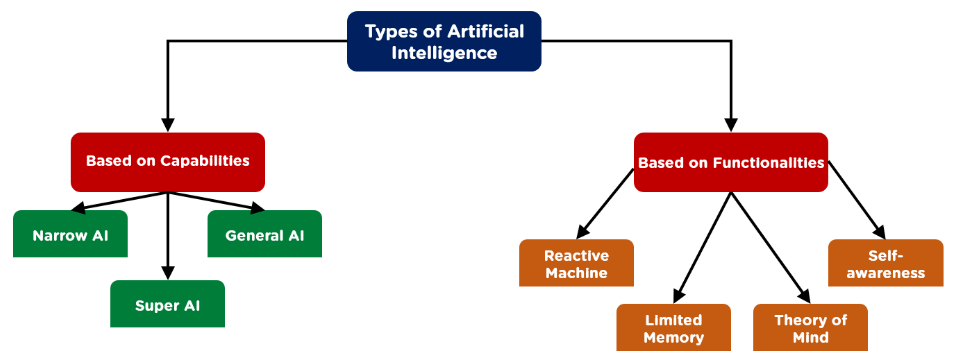
Artificial Intelligence
Artificial Intelligence (AI) refers to the simulation of human intelligence in computers and other machines. It involves the development of algorithms, software, and systems that enable machines to perform tasks that typically require human intelligence. AI aims to create machines that can mimic cognitive functions such as learning, reasoning, problem-solving, perception, and language understanding. AI continues to advance rapidly, with ongoing research in areas such as explainable AI (making AI's decisions more understandable), AI ethics, and the potential societal impact of AI technologies.
Learn more about Artificial Intelligence
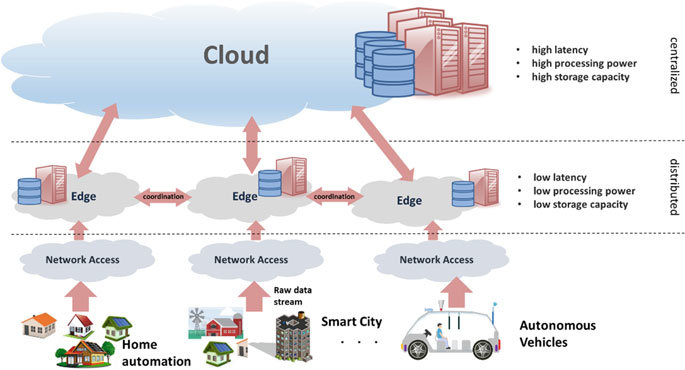
Edge Computing
Edge computing refers to a distributed computing paradigm that involves processing data closer to the source of data generation, rather than sending all the data to a centralized cloud or data center for processing. In edge computing, data is processed locally on devices or servers that are located closer to where the data is produced, such as at the "edge" of a network, hence the name. Edge computing is particularly relevant in scenarios where low latency and real-time processing are critical, such as industrial automation, smart cities, healthcare, transportation, and retail. It complements cloud computing, where certain tasks and data are still processed in centralized data centers. It's important to note that edge computing doesn't replace cloud computing but rather complements it, creating a hybrid model that leverages the strengths of both centralized cloud processing and decentralized edge processing to meet various application requirements.
Learn more about Edge Computing
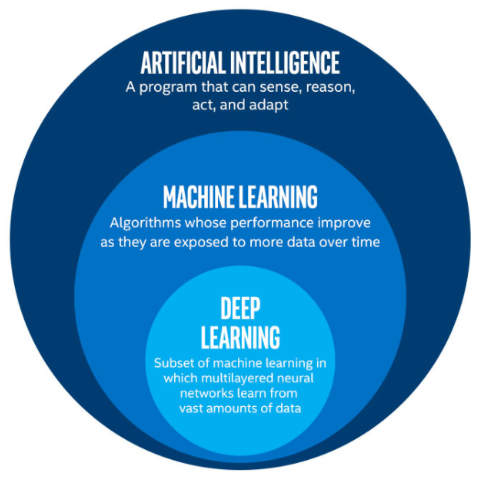
Machine Learning
Machine learning is a subset of artificial intelligence (AI) that focuses on the development of algorithms and models that enable computers to learn from and make predictions or decisions based on data. Instead of being explicitly programmed to perform a specific task, machine learning algorithms use statistical techniques to identify patterns, learn from examples, and improve their performance over time.
In traditional programming, a human programmer writes explicit instructions for a computer to follow. However, in machine learning, the computer learns to perform a task by analyzing and adapting to data.
Learn more about Machine Learning

Virtual Reality
Virtual reality (VR) is a technology that immerses users in a computer-generated simulated environment, often using a combination of visual, auditory, and sometimes tactile sensations. The goal of virtual reality is to create a convincing and realistic experience that allows users to feel as if they are truly present within the digital environment, even though they are physically in a different location.Virtual reality technology has been evolving rapidly, with improvements in display resolution, tracking accuracy, and the development of more sophisticated and natural interaction methods. Augmented reality (AR) and mixed reality (MR) are related technologies that overlay digital content onto the real world, allowing users to interact with both digital and physical elements simultaneously.
Learn more about Virtual Reality

DevOps
DevOps is a set of practices, principles, and cultural philosophies that aim to enhance collaboration and communication between software development (Dev) and IT operations (Ops) teams. The goal of DevOps is to streamline and automate the software development lifecycle, from code development and testing to deployment and maintenance, in order to deliver high-quality software more rapidly and efficiently. DevOps aims to accelerate the delivery of features and improvements while maintaining stability and reliability. By fostering collaboration, automation, and a focus on delivering value to end-users, DevOps helps organizations respond to market demands more effectively and efficiently.
Learn more about DevOps
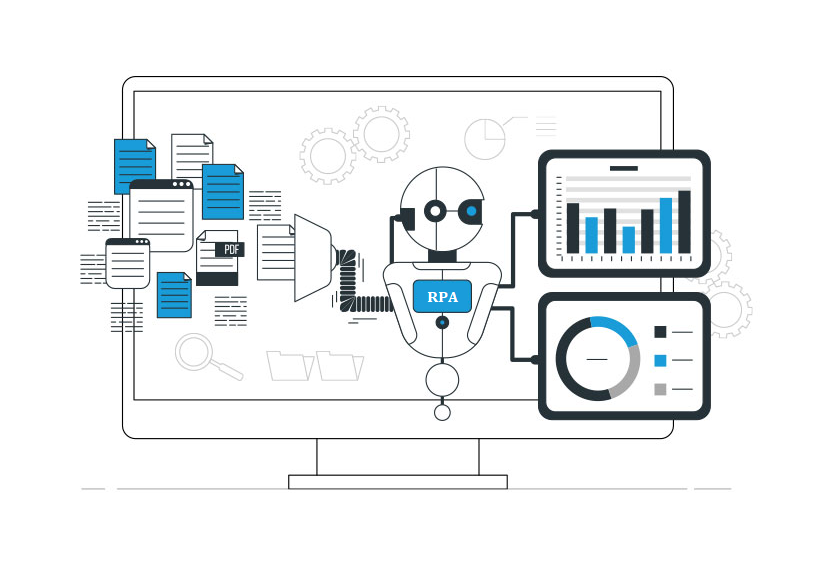
Robotic Process Automation
RPA stands for Robotic Process Automation. It is a technology that uses software robots or "bots" to automate repetitive and rule-based tasks or processes within business operations. RPA is designed to mimic human interactions with digital systems and applications, enabling it to perform tasks like data entry, data extraction, form filling, calculations, and more, just as a human employee would do. RPA is commonly used across various industries, including finance, healthcare, manufacturing, logistics, customer service, and more. It is especially valuable for processes that involve interacting with multiple systems, require data entry or extraction, and involve repetitive steps. However, RPA might not be suitable for processes that require complex decision-making, human judgment, or tasks that constantly change.
Learn more about Robotic Process Automation

Cognitive Computing
Cognitive computing is a branch of artificial intelligence (AI) that aims to create systems capable of simulating human thought processes, such as learning, reasoning, problem-solving, and understanding natural language. It goes beyond traditional AI techniques by incorporating elements of neuroscience, linguistics, and cognitive psychology to build systems that can interact with and understand humans in more natural and intuitive ways. It's important to note that while cognitive computing aims to mimic certain aspects of human cognition, it does not possess consciousness or self-awareness. Instead, it focuses on leveraging AI technologies to enhance the interaction between humans and machines in a more intelligent and intuitive way.
Learn more about Cognitive Computing
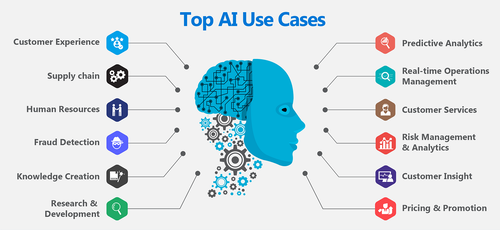
Top 10 Applications of AI
In the rapidly evolving landscape of technology, Artificial Intelligence (AI) has emerged as a transformative force, reshaping industries and revolutionizing the way we interact with the world around us and is being applied across various fields to enhance efficiency, accuracy, and innovation. From healthcare to finance, from manufacturing to entertainment, AI applications are proliferating and making a profound impact on diverse sectors. In this article, we delve into the top 10 AI applications that are reshaping industries and driving innovation.
Learn more about Top 10 Applications of AI
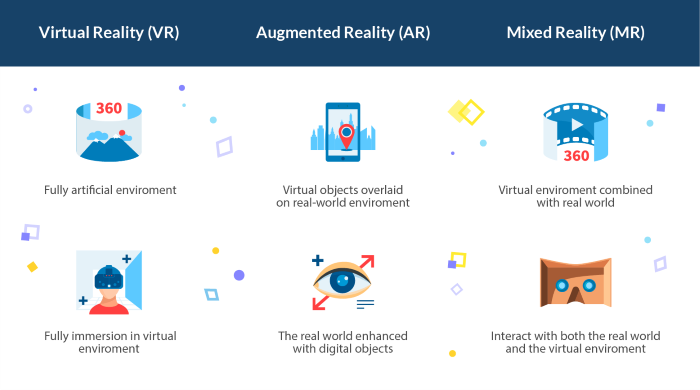
Augmented Reality
Augmented Reality (AR) refers to a technology that combines computer-generated elements, such as images, videos, or 3D models, with the real world in real-time. This creates an interactive and immersive experience for users by overlaying digital content onto their view of the physical environment. Unlike Virtual Reality (VR), which completely replaces the real world with a simulated one, AR enhances the real world with additional digital information. AR technology typically involves the use of cameras, sensors, and displays on devices like smartphones, tablets, smart glasses, or heads-up displays. These devices capture the user's surroundings and then superimpose virtual elements onto the real-world view. AR can be experienced through various applications, from gaming and entertainment to practical applications like navigation, education, healthcare, design, and more.
Learn more about Augmented Reality
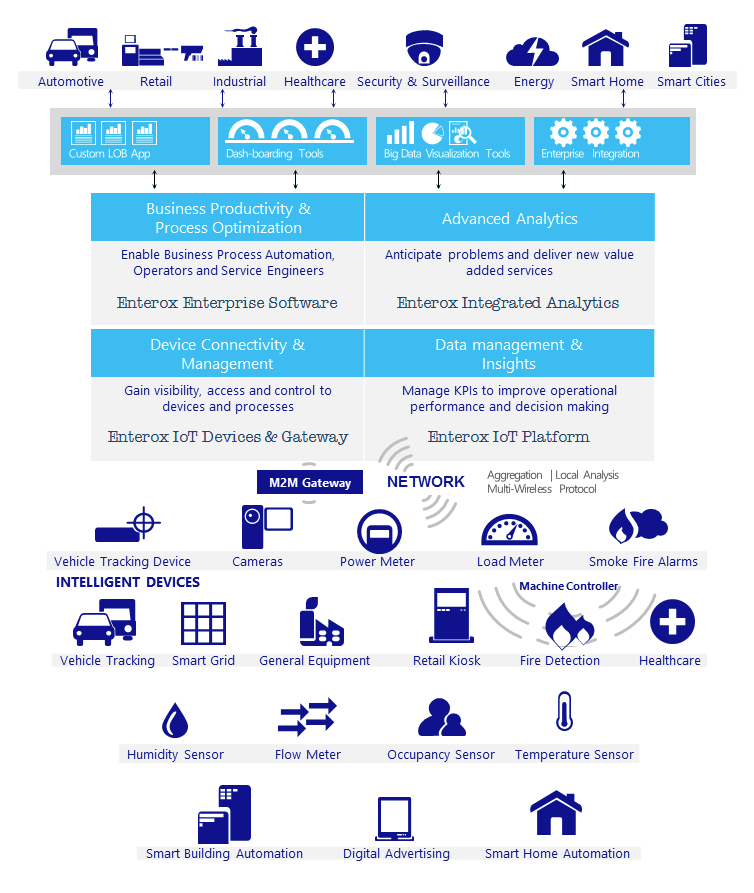
Enterprise Internet of Things
Enterprise Internet of Things is the next advancement in technology that enables physical 'things' with embedded computing devices (tiny computers) to participate in business processes for reducing manual work and increasing overall business efficiency. Taking advantage of a combination of technologies ranging from embedded devices with sensors and actuators to internet based communication and cloud platforms, the enterprise IoT applications can now automate business processes that depend on contextual information provided by programmed devices such as machines, vehicles and other equipments.
Learn more about Enterprise Internet of Things
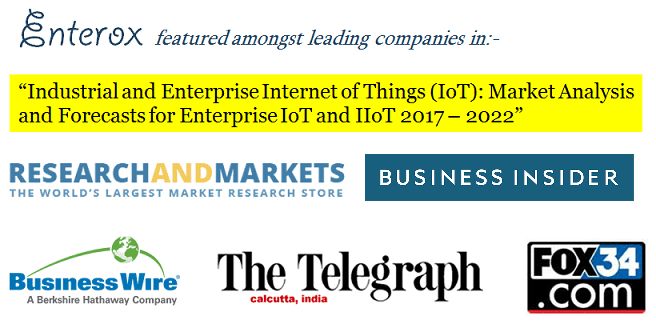
Enterprise IoT
Enterprise Internet of Things (IoT) refers to the use of IoT technologies and solutions within businesses and organizations to enhance operations, improve efficiency, and drive innovation. IoT involves connecting everyday objects, devices, and sensors to the internet and enabling them to collect, exchange, and analyze data. In the context of the enterprise, IoT focuses on deploying these connected devices and systems to address specific business needs and challenges.
Learn more about Enterprise IoT
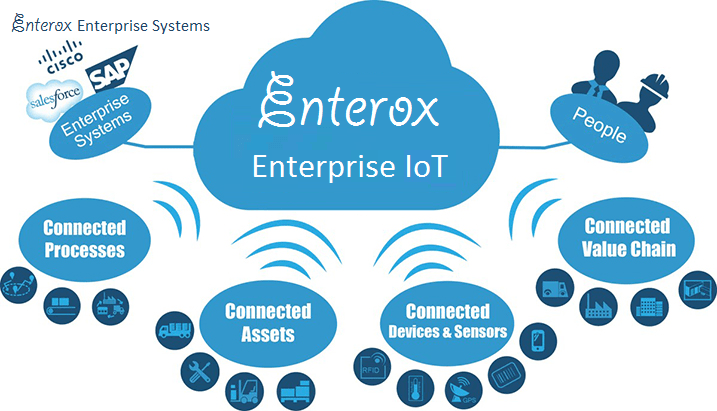
Enterprise System and Internet of Things
Enterprise System and Internet of Things is enabled by the latest developments in embedded systems, smart sensors, communication technologies, and Internet protocols. The basic premise is to have smart sensors and actuators deliver a new class of enterprise applications. The current revolution in Internet, mobile, device-to-device (D2D) and machine-to-machine (M2M) technologies can be seen as the first phase of the IoT. In the coming years, IoT is expected to bridge diverse technologies to enable new applications by connecting physical objects like devices and machines with business applications to support intelligent decision making.
Learn more about Enterprise System and Internet of Things
Join Famark Community!
Famark community is a social platform for creative and innovative professionals from different domains.
Join Community